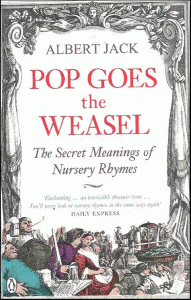 ‘Pop Goes The Weasel – The Secret Meaning of Nursery Rhymes’ by Albert Jack has a lot more meat on the bone than one might think. There’s plenty of satire and intrigue in these old songs, many of which refer to quite adult themes such as adultery, execution and mass killings over religion, politics, and so on. For example, Humpty Dumpty was not a giant egg but acquired that image from an illustration in Lewis Carroll’s ‘Through The Looking Glass’ by Sir John Tenniel. The real Humpty Dumpty was a powerful cannon used by Royalist forces during the English Civil War of 1642 to 1651 to defend the town of Colchester, the gun being placed atop a church tower. The Round Heads attacked the town for eleven weeks without success until eventually blowing away the top of the tower sending Humpty Dumpty crashing to the ground. The Royalists were never able to ‘put Humpty back together again’ and were soon overrun by Government soldiers.
‘Pop Goes The Weasel – The Secret Meaning of Nursery Rhymes’ by Albert Jack has a lot more meat on the bone than one might think. There’s plenty of satire and intrigue in these old songs, many of which refer to quite adult themes such as adultery, execution and mass killings over religion, politics, and so on. For example, Humpty Dumpty was not a giant egg but acquired that image from an illustration in Lewis Carroll’s ‘Through The Looking Glass’ by Sir John Tenniel. The real Humpty Dumpty was a powerful cannon used by Royalist forces during the English Civil War of 1642 to 1651 to defend the town of Colchester, the gun being placed atop a church tower. The Round Heads attacked the town for eleven weeks without success until eventually blowing away the top of the tower sending Humpty Dumpty crashing to the ground. The Royalists were never able to ‘put Humpty back together again’ and were soon overrun by Government soldiers.
Such songs brought news and views (often subversive) in a playfully disguised form. The hidden meanings or references have, in most cases, been long forgotten. In many the song appears to be nonsense. ‘Jack and Jill’ for example may not make much sense now but it has been suggested the boy and girl were Louis XVI of Fance and his queen Marie Antoinete who lost their heads in public executions (they came tumbling down). More possible meanings have been given this rhyme but, as with others, no one really knows now. However, one thing is certain, most nursery rhymes are not nonsense nor meant originally for children – it’s just that initial references have been lost in the mists of time.
The book, by the way, is highly recommended and just goes to show that satirical song writing has been around a very long time.
